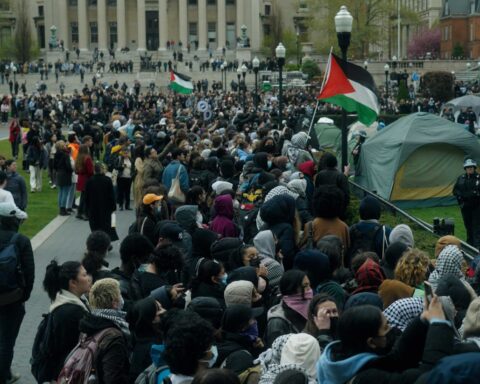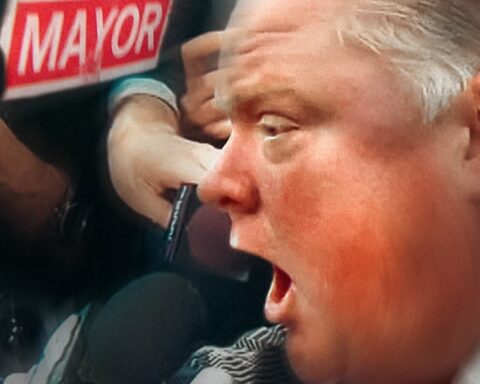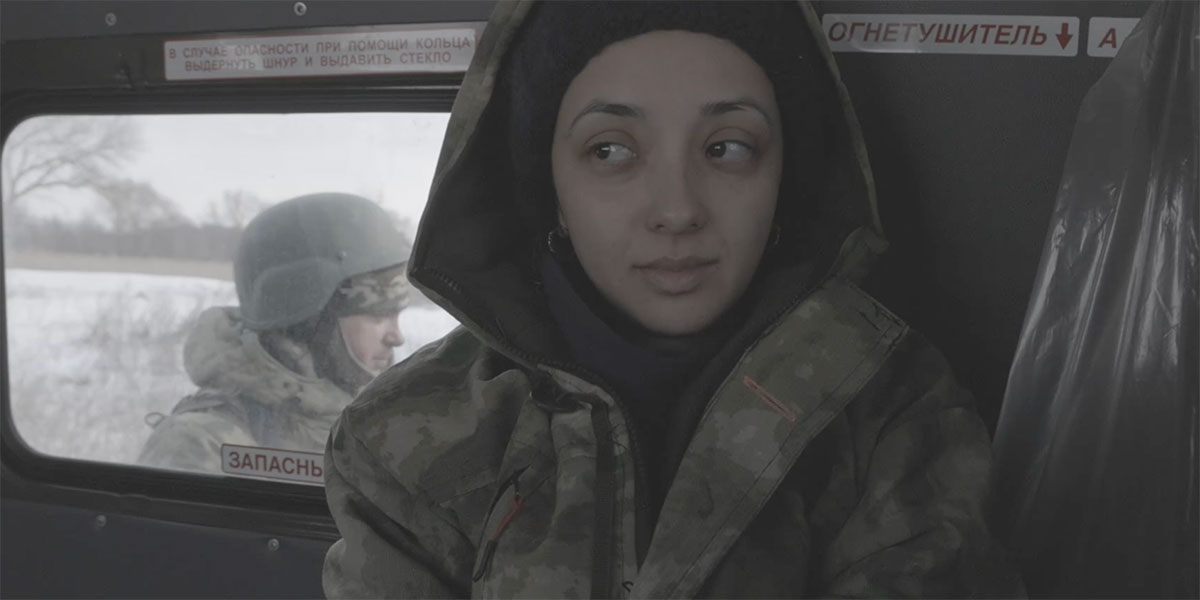“We are fighting for a different kind of future for the people in this land that is based on mutual security and justice,” says No Other Land director Yuval Abraham. To speak with the collaborators of this powerful documentary is to experience the significance of what it represents. Abraham, speaking with POV via Zoom from Jerusalem, is on the call with his co-director, Basel Adra, who is connected from Masafer Yatta in Palestine. No Other Land brings voices from both sides of a long-rooted conflict as a new generation strives to inspire change. The film, made with co-directors Rachel Szor (an Israeli journalist) and Hamdan Ballal (a resident of Masafer Yatta), shows through this collective a shared plea for peace.
No Other Land, which just had its Canadian premiere at the Toronto International Film Festival following an acclaimed run that drew prizes at Berlin, CPH:DOX, Sheffield, Visions du Réel, and other festivals, offers an urgent snapshot of the situation in Palestine. The film draws upon Adra’s longtime efforts documenting the hardships faced by his community of Masafer Yatta as people endure forced evictions and see their homes destroyed by settlers and Israeli soldiers.
As Adra joins forces with Abraham, an Israeli journalist also chronicling the home demotions, the production offers a roadmap to peace. They keep their cameras rolling with bracing immediacy as run-and-gun filmmaking becomes a fact of life in Basel’s own backyard. This film, simply put, is not an easy watch. But it’s essential to follow the filmmakers’ lead and refuse to look away.
POV spoke with Adra and Abraham via Zoom upon the Canadian premiere of No Other Land at the Toronto International Film Festival.
POV: Pat Mullen
BA: Basel Adra
YA: Yuval Abraham
This interview has been edited for brevity and clarity.
POV: How are you both doing? Basel, where are you now?
BA: I’m calling from my home in Masafer Yatta. I’m a bit tired to be honest, but generally doing okay. The film shows some communities being displaced. People decide to flee from their homes because of settlers’ and soldiers’ attacks. That’s not my community. It’s a big area with different small communities. Six of them decide to flee after they had so much pressure and attacks by settlers and soldiers.
POV: You’ve been filming from a very young age. What inspired you to follow the events in Masafer Yatta throughout your life with a camera?
BA: The camera is a main part of our community. It started around 2000 and it’s playing a role of [providing] evidence. This documentation is important for us. First of all, it shows the truth, it shows our lives to the world, and it shows the injustice that we are living and going through. Second of all, these videos and this evidence helps us a lot of time. For example, people might end up in jail because a soldier or a settler created a lie, like “this Palestinian guy attacked me,” or “he was throwing stones,” or “they’re in my field.” If we say the opposite, we will not be believed, but if we come with a video, the evidence shows that these settlers were shooting, these settlers were in the field, or these settlers came to our home with soldiers to attack us. It’s the only tool that we have to fight with.
POV: Yuval, what was your pitch to Basel at the beginning in terms of helping to tell this story?
YA: When I originally came to the area, my thought was not about helping Basel tell the story. I was focused on the Israelis because I’m Israeli. I felt a responsibility for what is going on in the occupied West Bank. The first time I met Basel, long before we began working on the film, I came as a journalist to the area to write about house demolitions. I thought that if you understand house demolitions, then you understand something bigger about the conflict. You understand something about the law. I was asking myself, “Why is it that almost every day you have Palestinian houses being destroyed and why are they [the Israeli army] building illegally?” I understood how the law plays a role in this, how they’re not able to get permits, how this is part of the policy that is aimed at pushing Palestinians off of their lands.
I wanted other Israeli people to understand this so there can be a political change. That way, we can move towards a future where there is no military occupation and both people have freedom and justice. I came to the area thinking about writing in Hebrew to other Israelis, and I met Basel who was already on social media and writing. We found a lot in common. We were joined by Rachel, who was another Israeli and a cinematographer, and Hamdan, who was a photographer from Masafer Yatta. Over time, we decided that what we are doing is not enough. Journalism is not enough. Maybe we can achieve something else with a film.
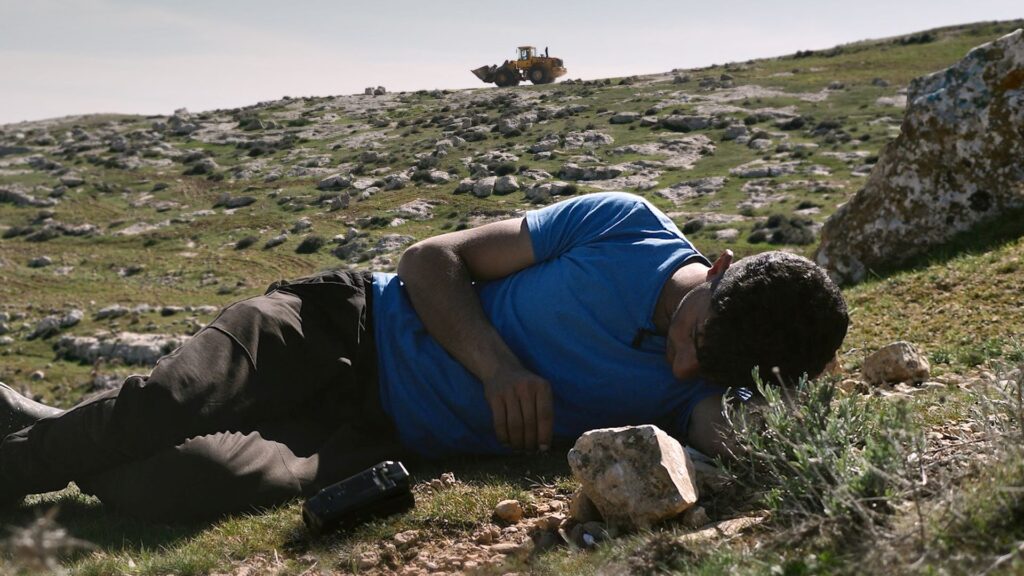
POV: You must have hours of footage. How do you decide which story to tell in a situation you’ve both been documenting for years and one with such a complex long historical background?
YA: It was such a challenge and it’s our first film, so none of us had any experience. It took us years to understand how to tell the story and how to choose from all of the footage because it’s ongoing. The film shows the process of destroying the Masafer Yatta community, but this literally is still happening every single day. At a certain moment, we realized that we have two main threads. On the one hand, we wanted to tell the story of the community, which is related to Basel’s childhood and the fight for the Palestinian people to stay on their land in the face of brutal violence while being pushed out of the land.
The other story we wanted to tell is the story of our own work and activism. We are a collective: We have Israelis and Palestinians and we have similar values. I think this is kind of rare. We are fighting for a different kind of future for the people in this land that is based on mutual security and justice. We wanted to show that in this film and to show the power imbalances between us. I’m talking to you right now from Jerusalem, which Basel cannot enter because he’s Palestinian. Like millions of other Palestinians, I can only go visit Basel. He can never come to visit me. We wanted to explore this in the film, so it shows the power imbalances that exist between us even though we are political allies. We believe in the same things, but still our lives are not equal.
We also didn’t do it alone. We are the co-directors and we also edited this film, but we got a lot of help on the way. We were part of a program called Closeup, which is for documentary films in the Middle East, which helped us understand what we wanted us to say. And we worked with Anna Fabini, an incredible editor who helped us refine the editing. It’s like we went to cinema school just working on this film for five years together.
We believe in the same things, but still our lives are not equal. – Yuval Abraham
POV: The film has an effective story when you look at Harun’s situation and his family after he’s shot for trying to prevent Israeli soldiers from stealing his generator. Why focus on that story out of many?
BA: Harun’s family and Harun’s story is the most tragic story that happened in the area. He’s a young guy who was shot over an electricity generator. This was a sign that the Israelis were going too far in order to prevent Palestinians from having clean water or electricity. It’s a story of the price you pay to have the necessities of life. You can sacrifice your life in order to build a home or to connect your home with electricity or a pipe for water to drink. It’s important example to show our own story. He deserved for his story to be here and to be seen by millions around the world. He tried to fight for something very basic that people in other countries don’t need to fight for it.
Part of the decision we made to keep the film politically independent was not to take funds from the Israeli state. – Yuval Abraham
POV: The film is made by collective of Israel and Palestinian filmmakers, but it’s also a Norwegian production. What was the role of getting Norwegian producers involved?
YA: We connected with Antipod Films. They’re from Norway and we met them quite early on. There was a connection with our producers. We felt that they respected our work as a collective and they understand us politically. Norway historically has supported films that speak about the occupation of the West Bank. Part of the decision we made to keep the film politically independent was not to take funds from the Israeli state. We felt it was wrong politically to fund the film from the country that is committing the crime that the film is about, which is the forced transfer of Palestinians from the West Bank. Norway as a [co-producer] could help us finance at least partially. Most of what we did and most of what we are still doing has been volunteer work. We are very much a guerrilla filmmaking style. We’re happy that films like this can still succeed internationally and we hope they will be seen by millions of people.
POV: Sometimes in documentary, there is a sense that people have to tell “both sides” of a story. How did you navigate that balance?
YA: In our film, there are two sides. I’m an Israeli and I’m in the film, and Basel is Palestinian and he’s in the film. When people say “two sides,” they often mean that they want to portray a false symmetry that does not exist in reality. When I watching 20 Days in Mariupol, for example, the documentary that won the Oscar last year and showed the Russian invasion of Ukraine, I’m not so sure people felt the need to see the Russian side. I’m not disregarding the needs of Israelis. I think that the way forward has to take into account the needs of both people on this land. But, specifically, if you look at Masafer Yatta, you have a community that is being violently controlled by foreign military and by settlers who illegal according to international law, according to the ICJ [International Court of Justice]. I’m not so sure that we need to show the side of the settlers or the side of the military in a film like this.
The camera is necessarily looking at reality from a certain direction. I think that our direction is truthful because it recognizes power imbalances.
POV: We see you both put yourselves at risk for filming with the violence becoming more targeted and escalated as you draw attention to the situation and gain more exposure in the media. Have you faced increased threats as a result of this film?
BA: I didn’t feel really like it [escalated] because of the film. My family got targeted, but to be honest, me and my family paid the price, and there is always a price for these things. The movie succeeded outside on the festivals and in the media, but the situation for me, for my family, and for my community is going really bad. It’s harder than before. This is because of the general situation that’s happening and because settlers have waited for an opportunity in these situations like this. They’re happy to move forward with building settlements and outposts while destroying more communities and homes of Palestinians. Although the movie is succeeding at festivals, we didn’t get to have political pressure on the State of Israel to stop or to decrease what it is doing against us Palestinians. The situation on the ground is worse and worse.
POV: What have you experienced as a result of making this film, Yuval, and getting the story out there, especially after October 7th?
YA: After the atrocities of October 7th, Israeli society pushed much farther to the right. There is less space for criticism, unfortunately. I think that is wrong.It’s more important than ever to raise our voices to reach a ceasefire in Gaza, but also to release the Israeli hostages and to end the killing of Palestinians in Gaza. We must realize after such a brutal year of violence that the only way forward can be a political solution. Unfortunately, this is completely out of the discourse right now in the Israeli political sphere and in the public. There was recently a vote in the Knesset where a majority—not only the Netanyahu coalition, but also people in opposition—voted for a law that says that there will never be any Palestinian state. So it’s only Israel between the river and the sea, and only eight people out of 120 opposed. It’s a very dark and dangerous situation.
Our film is urgent because we a plea for a different future based on freedom for the Palestinian people and on the two people being able to exist together equally in this land. To say these things in Israeli society is unpopular. I don’t live under military occupation, so I don’t have to worry about soldiers entering my house at night and beating me up. It’s mainly a social thing. Family members and people that you grew up with at school don’t want to talk to you. Or they call you a traitor or somebody who has abandoned the Israelis. I hope that 10, 20, 30 years down the line when there is political change, and there has to be a political change eventually, people will look back at this moment and appreciate those who were fighting for change, justice, and equality.
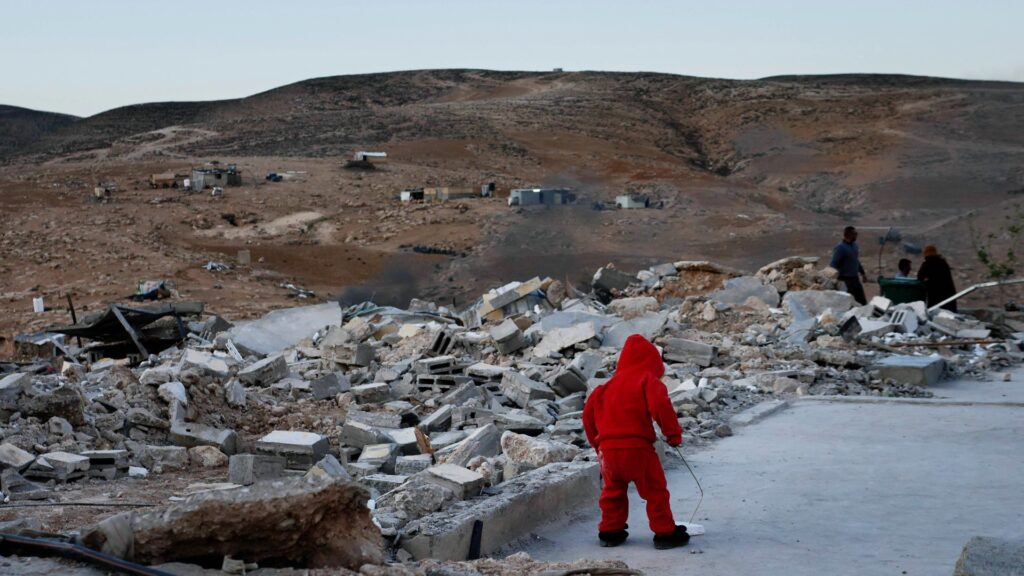
POV: At the end of No Other Land, we see that you were more or less done filming before October 7th. Can you explain the choice to get the film out there now as opposed to continuing to document?
YA: We ended the filming a few days before October 7th and we felt that we needed to release it before the community of Masafer Yatta was gone. For us, the film is not only a work of art or historical document: It’s a tool for change. We made it so that people watch it. People who maybe don’t agree with us will watch it and we’ll have some kind of conversation with them and something might change in them.
POV: There’s a powerful moment late in the film, Basel, when you ask Yuval if he can envision a day when you can both have families. That scene is really touching because it shows how you’ve been so focused on defending your home in the present that there’s a challenge of planning for a future. Have you been able to answer that question yourself since making the film?
BA: Planning for the future in this situation is really hard. Even the question about getting married. I got married and we’re awaiting a baby, inshallah, but it’s difficult to think about the future. It’s unsustainable situation. You don’t know what the future will look like. I don’t know where we will be, to be honest, and if we will continue in our community. It’s a lot of questions and the answers are unclear. This is the truth.
I would ask them to keep protesting to end this injustice and this occupation. – Basel Adra
POV: For audiences in Toronto or anywhere around the world who see the film, what can they do after?
BA: We made this movie to tell the people the truth. What’s happening to us is not just because of the Israelis, because Israel’s getting support from western governments like the U.S., Canada, and other governments. People need to see what their money is serving and need to act because they have responsibility, not just from solidarity perspective, but their governments who supporting it. This needs to stop and people need to act about it, talk about it, vote for the right people. I would ask them to keep protesting to end this injustice and this occupation.
YA: Actions needs to match the rhetoric. Canada has expressed a lot of rhetoric about the need for two state-solution and the need for a political solution. But I don’t think they have taken sufficient action that would help us achieve that on the ground. They need to know that there are Palestinians and Israelis who want that and would want them to take more action to actually to use the tools that they have to pressure the Israeli governments to end this occupation and to reach a political solution. This is what we dream about and we hope to see in our lifetimes.
No Other Land screened at TIFF 2024 and plays additional festivals on the circuit.
Get more coverage from this year’s festival here.
Update (2/4/2025): No Other Land screens for free at Hot Docs‘ For Viola series on Feb. 7. It opens at TIFF that same day.





